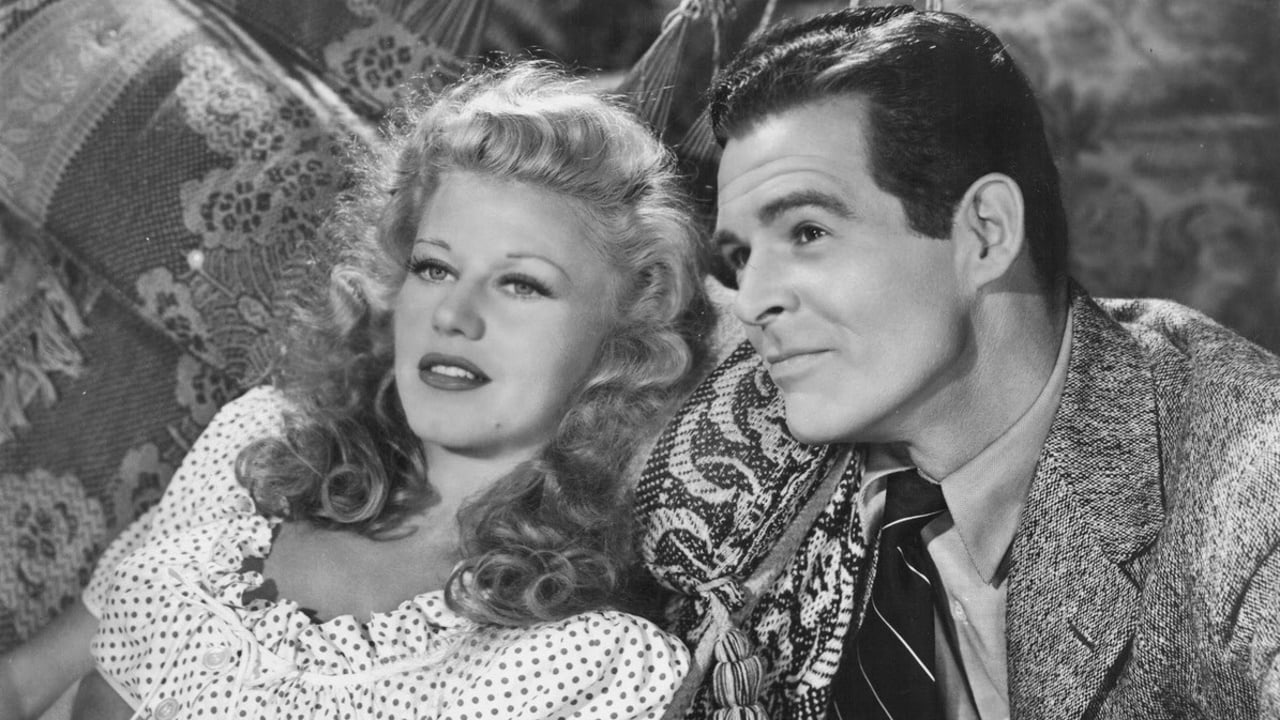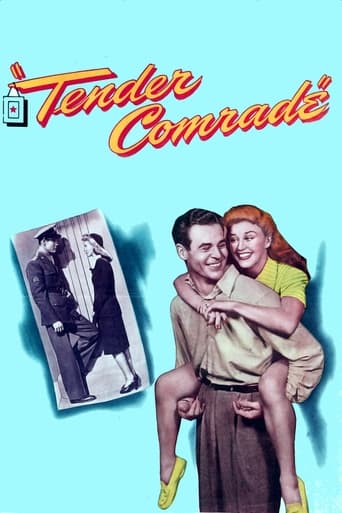


Too much of everything
... View MoreLack of good storyline.
... View MoreI like Black Panther, but I didn't like this movie.
... View MoreThe thing I enjoyed most about the film is the fact that it doesn't shy away from being a super-sized-cliche;
... View MoreReleased in 1943/1944, "Tender Comrade" gets its title from a poem called "My Wife", by Robert Louis Stevenson, which glowingly lists the wonderful traits of his wife. The first line of the third stanza reads: "Teacher, tender, comrade, wife". Note the comma that separates the words "tender" and "comrade". He was not describing a comrade who is tender, but a comrade who also tends.The film starts with written lines from the poem, then graphically extracts the two words of the title. Were they trying to honor Stevenson with their attribution? Or were they trying to make it clear that the word "comrade" was not an overt effort to allude to the common communistic sobriquet? Regardless, given the overreaching sophistry of those who found communist tendencies everywhere, it is a wonder someone didn't find guilt by association, given Stevenson's atheism and his socialist leanings.The film is written by Dalton Trumbo--one of the best screenwriters of all time. Author of the great anti-war novel, "Johnny Got His Gun", Trumbo also authored the screenplays for "Exodus", "Spartacus", and "Roman Holiday". He was awarded two Oscars.Trumbo joined the Communist Party in 1943. It was not illegal to do so and at the time, Russia was an ally of the U.S. in WWII. Clearly, Trumbo was anti-fascist. Was he anti-American in any way? An examination of the film may clarify his views.The story of the film, like most of its time, is clearly aligned with war efforts on the homefront and includes much of the patriotic propaganda that was prevalent. As you might guess, with a title that refers to wives, "Tender Comrade" focuses on the wartime lives of wives whose husbands are serving in the military.Four women who work in the Douglas aircraft plant a la Rosie the Riveter, decide to combine their meager paychecks so that they can afford a larger home and achieve greater purchasing power. They hire a German housekeeper, whose husband is also serving in the U.S. armed forces. The entire film is written from their perspectives, but especially from the perspective of the main character, Jo Jones (Ginger Rogers). Throughout the film, via Jo's flashbacks, we are taken back to moments in her life with her husband, Chris (Robert Ryan).Interestingly, the moments Jo reflects on are not all moments of great joy. In fact, they show that the relationship of the young couple, though loving, was full of disharmony and arguments, even when he proposed to her. Nevertheless, Jo is dedicated to the homefront support of her husband and all the troops. She, more than any of the other wives, mouths the patriotic slogans that were so common at the time, supporting rationing, conservation, and every manner of emotional and active support. The men were making their sacrifices for democracy, so those back home needed to do their part.The term "democracy" is loosely thrown around during the film, which is not unusual, since it had become nearly synonymous with the American way of life since WWI. Early on, the women say they will run their joint household like a democracy, voting to make decisions. They decide to use only one car and "share and share alike". Later, when one woman receives a medal in the mail from her husband, they say it is a medal for all of them to "share and share alike". For them it is a symbol of their joint efforts and sharing is a part of their fight for democracy. A few years after the film, Dalton Trumbo would be called before the House Committee on Un-American Activities. He would be part of the Hollywood Ten, who refused to give the names of Communists in the film industry. He would be blacklisted and have to work in secrecy, unable to claim his Oscars until many years later. Among the flimsy evidence used against him was the word "Comrade" in the title of this film and the communal living style of the five women. But anyone who watches the film can see that Trumbo's screenplay "does its part" for America, pushing every emotional button in service to the nation's massive and comprehensive effort to win the war.The truth is that wartime America is not the freewheeling, freedom-loving America of peacetime. The choices made by the five women reflect the extreme efforts made by American society in general. Many freedoms were (temporarily) sacrificed by all. Basically, martial law prevailed over the nation, demanding that all citizens live for a greater good--an effort that might be described as communal.While filming "Tender Comrade", Ginger Rogers realized that some aspects of the film, in her opinion, had a "Communistic turn", including some of her lines. In particular, the line she objected to was "share and share alike" and she had the producer give that line to other actors, she said. However, if you pay attention, you will hear her say that line when discussing the car, so her memory is somewhat suspect.During the making of this film, Ginger's husband, Jack Briggs, was serving in the military and awaiting orders, so she was very in-tune with the feelings of concern and self-sacrifice experienced by Jo and the other character wives.But this film is not one of Trumbo's best. It suffers from slow moments and a disjointed storyline. The acting in the film is uneven. Ms. Rogers' performance alternates between very solid and noticeably weak. In all, the this is a vey interesting film, but not exceptional in any way.
... View MoreNo, this is not some Russian comedy staged during World War 11. That's what I thought it was about when I saw the title of this 1943 film.Instead, we get a nicely crafted story with Ginger Rogers and Robert Ryan, a young idealistic couple, whose plans are thwarted by World War 11. Yes, this is another home front picture. Several women decide to live in the same house when their spouses go off to war.Definitely a tribute to the human spirit. Flashbacks are well done to show that the problems that Ryan and Rogers encountered with their marriage mean nothing when our country called upon its citizenry to create their finest moments.While the movie ends on a down note, Rogers' final lines may be regarded as a bit too preachy; however, they were needed and served the country well during one its many critical periods.
... View MoreWhile it's true that this film isn't nearly the drama that SINCE YOU WENT AWAY was, it is still an exceptional view of the impact of WWII on the families at home. Despite a very minor problem (which I'll talk about later), the film has great emotional impact even today and I dare you to watch it all the way through and keep a dry eye! The main character of the film is Ginger Rogers and is about her dealing with life without her husband, Robert Ryan, who is at war. While he does appear in the first 15 minutes or so of the film, he is primarily seen through a series of flashbacks interspersed through the movie. These all give background as to the life this couple shared before the war. As for Ryan, he came off very well in these vignettes, though Rogers' character seemed a bit too petulant to be believable and I was half expecting Ryan to slap her upside the head to shut her up (folks, I am NOT encouraging spousal abuse--relax)! Later in the film she had mellowed quite a bit and was indeed a very sympathetic and good character.Ginger and her co-workers begin talking after Ryan goes back to the war and they mutually decide to rent a house together and share expenses. At this point, the story involved the the lives of these four other women--their motivations, back story and character. This is all told in a very effective manner and you really begin to care for the ladies.The purpose of this tearjerker was to solidify the resolve for the war with the people left behind in the States and in this light, this was a super-effective film. Generally excellent writing, direction and acting make this a film that is easy to connect to and like. It also makes the movie a tough one to watch, as you tend to go through an emotional roller-coaster because of all the ladies' trials and tribulations. A wonderful time capsule of the era and a film well worth seeing.Oddly, in later years, many of those responsible for this film were labeled "Communists" and the film was cited as an example of these left-leaning sympathies. Other than the fact the ladies live together and share their money, I really can't see how any sane person could construe this as Communism--and what's the matter with sharing a home and expenses anyway? I did that a while back and I don't THINK I'm a Communist!!
... View MoreI remember when we first got cable and had AMC. (This was back when AMC really did show the golden oldies... real classics.) It was at the beginning of the summer, and so of course i spent my days watching AMC, and my evenings watching I Love Lucy. This was on AMC twice one week, and I loved it. I have been searching for a copy of it ever since. I have checked every movie rental place (including one with dozens and dozens of the good old movies... Gene Kelly, Ava Gardner, etc.) and no one nearby seems to have one. Not even on ebay could I find a copy. I have craved this movie ever since that summer, and remember it as being one of the best movies I had ever seen. I highly recommend it to anyone who is interested in this type of movie. It is excellent. I miss it so much, I just wish i could see it again.
... View More